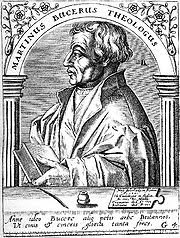 I think it was in college when I realized that I could actually read the famous authors that I was used to just read about. To read Calvin or Augustine or the Didache on my own was a thrilling discovery. Primary sources are sometimes harder, but almost always better. So I always enjoy reading old, dead saints.
I think it was in college when I realized that I could actually read the famous authors that I was used to just read about. To read Calvin or Augustine or the Didache on my own was a thrilling discovery. Primary sources are sometimes harder, but almost always better. So I always enjoy reading old, dead saints.
Over the past week I’ve been working through Concerning the True Care of Souls by Martin Bucer. Kudos to Banner of Truth and translator Peter Beale for giving us this never-before-in-English treatise from the great Strasbourg Reformer (with a fine historical introduction from the late David F. Wright I might add). Bucer (pronounced Butzer), is best known nowadays as a mentor and formative influence for John Calvin, but he was an important Reformer in his own right. Born in 1491, Bucer spent most of his ministry in Strasbourg, Germany and finished his life teaching at Cambridge. His passion as a Reformer comes through in the (very) full title (aren’t you glad we have dust jackets today?) of this 1538 work:
Concerning the true care of souls and genuine pastoral ministry, and how the latter is to be ordered and carried out in the church of Christ: Here you will find the essential means whereby we can escape from the present so deplorable and pernicious state of religious schism and division and return to true unity and good Christian order in the churches. Knowledge which is useful not only to the congregations of Christ, but also to pastors and rulers.
This book was Bucer’s effort to reintroduce church disipline, establish multiple-elder rule, and maintain the practice of evangelical penance in Strasbourg. Not everything in the book is especially helpful. Bucer doesn’t write particularly well (lacking the passion of Luther and the precision of Calvin) and the place he gives to magistrates in the affairs of the church marks him as a man of his times. But Bucer’s concern for the church and his conception of pastoral ministry are historically important and personally challenging.
This paragraph captures the spirit of the book.
From this it is evident that there are five main tasks required in the pastoral office and true care of souls. First: to lead to Christ our Lord and into his communion those who are still estranged from him, whether through carnal excess or false worship. Secondly: to restore those who had once been brought to Christ and into his church but have been drawn away again through the affairs of the flesh or false doctrine. Thirdly: to assist in the true reformation of those who while remaining in the church of Christ have grievously fallen and sinned. Fourthly: to re-establish in true Christian strength and health those who, while persevering in the fellowship of Christ and not doing anything particularly or grossly wrong, have become somewhat feeble and sick in the Christian life. Fifthly: to protect from all offense and falling away and continually encourage in all good things those who stay within the flock and in Christ’s sheep-pen without grievously sinning or becoming weak and sick in their Christian walk (70).
I find several things noteworthy in this paragraph.
1. Bucer’s emphasis on evangelism. He comes back to this time after time in the book: the work of the pastor is to seek the lost. Sometimes we are led to believe that no one thought about evangelism in Christendom, but Bucer clearly did.
2. Bucer’s five-fold description of those under our charge. The pastor (and anyone engaged in pastoral ministry Bucer would say) must seek the lost, bring back the wandering, restore the fallen, strengthen the weak, and encourage the strong. Let me suggest this is a mighty helpful way to look at your congregation before you preach, or your kids as you parent, or your “flock” (whatever it might be).
3. Bucer’s focus on people. I’m struck by the fact that his definition of pastoral ministry is all about the people to whom we minister. The focus is not on administration (though I’m sure he did some of that), nor on programs (though I’m not against them), nor on meetings (though we all have them), but on the people that need our help.
Concerning the True Care of Souls is not a difficult read. The layout is nice and there are plenty of headings to keep you on track. Elders and pastors will especially benefit from Bucer’s heart and wisdom. Nothing earth-shattering here, but solid.
So let me say it one more time: read old books.



